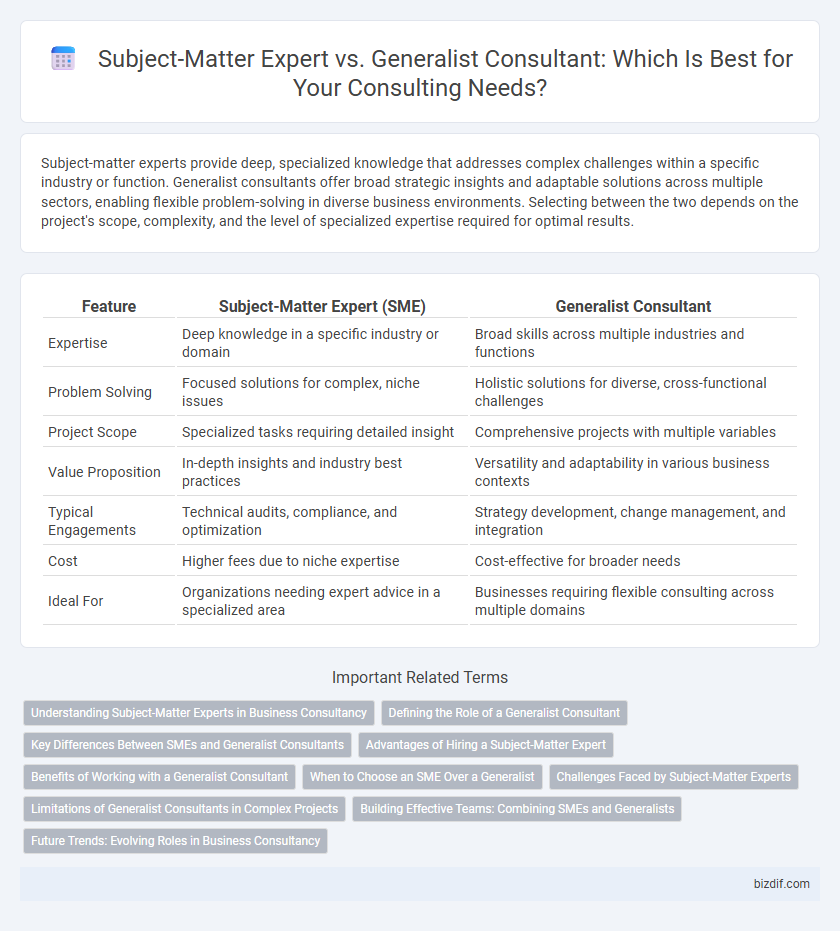Subject-matter experts provide deep, specialized knowledge that addresses complex challenges within a specific industry or function. Generalist consultants offer broad strategic insights and adaptable solutions across multiple sectors, enabling flexible problem-solving in diverse business environments. Selecting between the two depends on the project's scope, complexity, and the level of specialized expertise required for optimal results.
Table of Comparison
| Feature | Subject-Matter Expert (SME) | Generalist Consultant |
|---|---|---|
| Expertise | Deep knowledge in a specific industry or domain | Broad skills across multiple industries and functions |
| Problem Solving | Focused solutions for complex, niche issues | Holistic solutions for diverse, cross-functional challenges |
| Project Scope | Specialized tasks requiring detailed insight | Comprehensive projects with multiple variables |
| Value Proposition | In-depth insights and industry best practices | Versatility and adaptability in various business contexts |
| Typical Engagements | Technical audits, compliance, and optimization | Strategy development, change management, and integration |
| Cost | Higher fees due to niche expertise | Cost-effective for broader needs |
| Ideal For | Organizations needing expert advice in a specialized area | Businesses requiring flexible consulting across multiple domains |
Understanding Subject-Matter Experts in Business Consultancy
Subject-Matter Experts (SMEs) in business consultancy provide deep, specialized knowledge in specific industries or technical domains, enabling precise problem-solving and strategic recommendations. Their expertise drives targeted solutions that address complex challenges within niche areas, enhancing the credibility and effectiveness of consultancy services. Companies leverage SMEs to gain competitive advantages through informed decision-making based on detailed industry insights and advanced technical know-how.
Defining the Role of a Generalist Consultant
A Generalist Consultant provides broad expertise across multiple business functions, enabling flexible problem-solving and integrated strategy development. They synthesize diverse industry knowledge to address complex challenges without being limited to a single specialty, facilitating cross-functional collaboration. Their role involves adapting insights from various domains to tailor solutions that meet clients' unique needs and drive sustainable growth.
Key Differences Between SMEs and Generalist Consultants
Subject-Matter Experts (SMEs) possess deep, specialized knowledge in a specific industry or technical domain, enabling them to provide highly detailed solutions and insights. Generalist consultants offer a broad range of skills across multiple industries, focusing on strategy, process improvement, and change management to address diverse business challenges. SMEs drive innovation through technical expertise, while generalists enhance organizational effectiveness by integrating cross-functional perspectives.
Advantages of Hiring a Subject-Matter Expert
Hiring a subject-matter expert (SME) ensures access to specialized knowledge and advanced skills that drive precise problem-solving and innovative strategies within a specific industry or domain. SMEs offer deep insights and credibility, reducing project risks and accelerating decision-making processes. Their focused expertise improves efficiency, enhances compliance with industry standards, and delivers tailored solutions that generalist consultants may not provide.
Benefits of Working with a Generalist Consultant
Generalist consultants bring versatile expertise across multiple industries, enabling them to identify innovative solutions by connecting diverse business functions. Their broad perspective facilitates strategic problem-solving and adaptability in dynamic market conditions. Working with a generalist consultant often results in holistic growth strategies that integrate various organizational aspects seamlessly.
When to Choose an SME Over a Generalist
Subject-Matter Experts (SMEs) should be chosen over generalist consultants when a project requires deep, specialized knowledge to solve complex issues or implement intricate solutions within a specific industry or technology. SME consultants bring advanced expertise and proven methodologies that ensure precision and innovation in highly technical or regulated environments. For critical tasks such as compliance audits, technical system integration, or niche market analysis, engaging an SME maximizes the likelihood of achieving accurate, actionable outcomes.
Challenges Faced by Subject-Matter Experts
Subject-matter experts in consultancy often face challenges such as limited adaptability when projects require cross-functional knowledge beyond their specialization. They may struggle with communication barriers, as translating complex technical details into actionable business strategies can be difficult for diverse client teams. Additionally, their deep focus on niche areas can hinder agility in addressing broader organizational issues, often demanding collaboration with generalists to deliver comprehensive solutions.
Limitations of Generalist Consultants in Complex Projects
Generalist consultants often face challenges when managing complex projects due to limited deep expertise in specific technical domains, resulting in less effective problem-solving and risk management. Their broad knowledge base may overlook critical nuances integral to specialized fields, leading to suboptimal strategy development and implementation. This limitation underscores the necessity for subject-matter experts who bring focused skills and in-depth understanding essential for navigating intricate project requirements.
Building Effective Teams: Combining SMEs and Generalists
Building effective consultancy teams hinges on leveraging the specialized knowledge of Subject-Matter Experts (SMEs) alongside the versatile problem-solving skills of generalist consultants. SMEs provide deep technical expertise and domain-specific insights essential for addressing complex challenges, while generalists offer adaptability and strategic thinking that bridge diverse business functions. Combining these roles enhances collaborative decision-making, fosters innovation, and ensures comprehensive solutions tailored to client needs.
Future Trends: Evolving Roles in Business Consultancy
Subject-Matter Experts in business consultancy provide deep, specialized knowledge crucial for complex, industry-specific challenges, increasingly leveraging AI and advanced analytics to deliver precise insights. Generalist consultants offer versatile problem-solving skills and broader strategic perspectives, adapting swiftly to diverse client needs and integrating cross-functional trends such as digital transformation and sustainability. Future trends indicate a growing hybrid model where expertise depth intersects with adaptive generalist capabilities to drive innovation and competitive advantage in dynamic business environments.
Subject-Matter Expert vs Generalist Consultant Infographic

 bizdif.com
bizdif.com